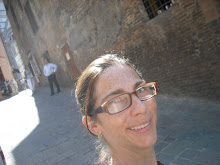I wonder why the translators of this highly recommended and very readable edition of the Tao Te Ching leave "Tao" untranslated, although they make it clear in the introduction that one should have in mind the English words "way" and "path" when one reads it; but, they do not leave "Te" untranslated, although they say that their translation of it as "virtue," could be misleading to Western readers.
Mainly, I'm sorry not to have the relationship of Tao and Te more visible in the text. The following chapter is a striking case in point. Each time the translator uses "virtue," I've substituted "Te."
All things arise from Tao
They are nourished by Te.
They are formed from matter.
They are shaped by environment.
Thus the ten thousand things all respect Tao and honor Te.
Respect of Tao and honor of Te are not demanded,
But they are in the nature of things.
Therefore all things arise from Tao.
By Te they are nourished,
Developed, cared for,
Sheltered, comforted,
Grown, and protected.
Creating without claiming,
Doing without taking credit,
Guiding without interfering
This is Primal Te.
#51
Look at the pattern that emerges! With the Te more obvious, one can see why this is the Tao Te Ching (the Way Virtue Book) and not just the Tao Ching.
Not to take anything away from the Tao--I have far to go before I know the way; but, Te is clearly central to the book, and centrally interesting to me. It seems, in fact, that a central difference between those who maintain an engagement only with the surface of the Tao Te Ching are described as those who do not attempt it in practice, that is, those who neglect Te. If that is right, then an active knowledge of Te is requisite to a deeper engagement with Tao.
All of this sounds a lot like Aristotle to me. Dozens of time I've explained to students that Aristotle's subject in the
Nicomachean Ethics is not abstract knowledge, but deliberate action. to act virtuously, for Aristotle, is to act in the right way, at the right time, for the right reasons. All of these qualities of action require careful deliberation regarding the nature of one's situation and one's own nature; but, none of these deliberations are possible without experience, and no conclusion that one could draw from such careful deliberation would be complete unless it were acted upon. So, the development of virtue demands both a development of one's understanding of virtue and the crafting of one's character such that one develops the habit of acting on one's best lights. Virtuous action depends on careful, clear consideration of the nature of the "way things are" and of one's own nature; but knowledge of the way things are (in the world and in oneself) requires action that approximates virtue.
Is this the same as (or similar to) Lao-Tzu's notion that one must learn the Tao to develop Te and practice Te in order to see the Tao more clearly? Sort of looks like it to me.


